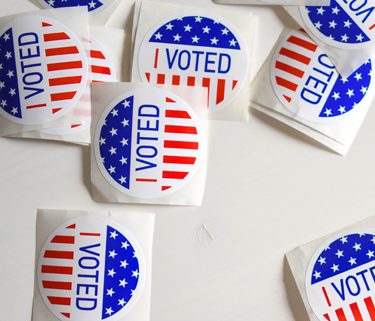This Election Year, Know Your Voting Rights!
Voting is an essential part of our democracy and our right as citizens.
Too often, people with disabilities struggle to be able to vote.
Here are some (but not all) of the reasons that people may struggle:
- Polling places may not have accessible entrances, spaces, machines, or ballots.
- Poll workers and election officials may not have had adequate training on how to support or communicate with people with disabilities, especially voters who also are members of other groups that have been treated unfairly in the past.
- Poll workers may assume a person cannot vote because they have a disability or are under guardianship.
- Voter suppression laws may have restricted the ways that voters with disabilities can receive assistance in voting or made it harder to vote by mail.
People with disabilities who have guardians face barriers to voting that are out of line with federal law.
Nationwide, thousands of people with disabilities have guardians.
Guardianship occurs when a court determines a person is unable to make some or all of their own decisions. They appoint a guardian to make certain decisions for the person.
Right now, some states have passed laws that ban people with guardians from voting or make people work harder to show that they can vote.
And many people believe or have heard wrong information from poll workers, family members, or direct care workers that people with disabilities cannot vote if they have a guardian.
Recently, the U.S. Department of Justice (DOJ) clarified voting rights for everyone and said people who have guardians can vote.
Specifically, the DOJ shared states cannot:
- Ban people from voting or registering to vote just because they have a guardian or conservator.
- Make rules that make voters work harder to show they are eligible to vote, like through petitioning the court to vote or taking a competency test.
- Ban voters with disabilities from receiving the help they need to vote.
The DOJ also shared more about the help voters can get throughout the voting process.
- Voters can get help requesting, completing, or returning a ballot.
- They can get help when they vote in person, absentee, or by mail-in ballot.
- They must be able to get help from someone they choose – not just from an election worker.
- Voters with disabilities who need help putting their ballot in a mailbox or drop box must be able to get help from someone they choose.
What Can I Do?
- Know your voting rights and make sure that you are ready to vote. Visit thearc.org/vote to learn more.
- Speak with your guardian or the person you act as guardian for (if you have one) about this news and how it impacts you. Learn more about voting rights under guardianship.
- Share this news with others. Everyone should know what the right rules are.
- Speak up if your rights are denied or if you see someone else’s rights denied! Contact your local protection and advocacy organization. They provide legal aid to people with disabilities. They can help you make a complaint to your election office or figure out your next steps.








